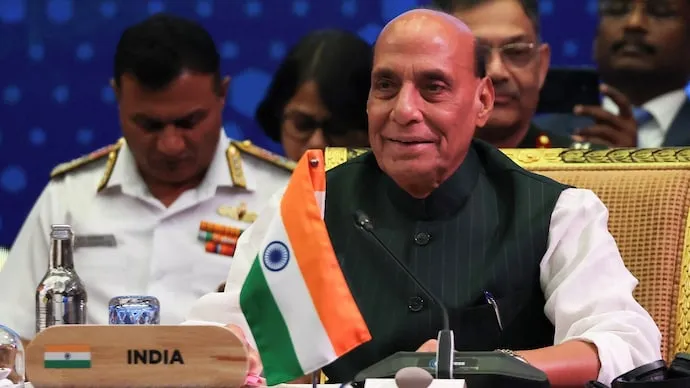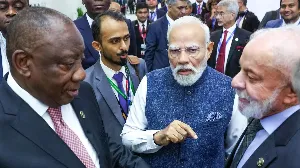Rajnath Singh Suggests Sindh Could Rejoin India Amid Civilisational Ties

Defence Minister Rajnath Singh stated on Sunday that although the Sindh region is currently part of Pakistan, it remains intrinsically linked to India's cultural heritage. Speaking at the Sindhi Samaj Sammelan in New Delhi, Singh indicated that geopolitical boundaries are not fixed and expressed the possibility that Sindh could return to India in the future.
'Sindh may not be part of India today, but civilisationally, it will always be a part of India. Borders can change. Who knows, tomorrow Sindh may return to India again?' said Singh during his address.
Sindh, located in present-day Pakistan, is significant for the Sindhi community, a large ethnic group in India. Historically, Sindh was integrated into undivided India until the partition in 1947, when it was assigned to Pakistan. The region is also noted as the birthplace of the ancient Indus Valley Civilisation.
Referencing the influential Bharatiya Janata Party leader Lal Krishna Advani, Singh highlighted the enduring emotional connection that many Sindhi Hindus feel towards their ancestral homeland. He noted that many individuals from this community have not fully accepted the separation of Sindh from India.
In his remarks, Singh stated, 'Many Sindhi Hindus of that generation have not fully accepted the separation of Sindh from India. Both Hindus and many Muslims in Sindh have historically regarded the waters of the Indus River as sacred.' He further recalled Advani's observation that the Indus River holds significant spiritual value for both communities.
The Defence Minister's comments come at a sensitive time in India-Pakistan relations, especially following military operations between the two nations. Singh's statements are likely to provoke diplomatic responses from Pakistan, given the historical tensions surrounding the region.
In addition to discussing Sindh, Singh also addressed the Citizenship Amendment Act (CAA), which aims to provide protection to minority communities from neighbouring countries who have faced persecution. He emphasised the importance of this legislation for Sindhi Hindus, who he claimed have experienced discrimination and violence.
'For years, minority communities in many neighbouring countries have suffered. Their homes have been destroyed, their lives disrupted, and they have faced severe discrimination. When they manage to escape to India, they are often treated poorly by governments focused on political appeasement,' Singh stated.
He added that Prime Minister Narendra Modi was instrumental in recognising the plight of these communities, which led to the introduction of the CAA. The Act facilitates citizenship for non-Muslim migrants from Pakistan, Bangladesh, and Afghanistan who entered India before December 31, 2014.
Singh's remarks reflect ongoing discussions within Indian politics regarding the rights of minorities and the historical context of the region. As these topics continue to evolve, they are likely to remain at the forefront of public and diplomatic discourse.

Prime Minister Modi Outlines Key Proposals at G20 Summit

Tragic Death of Wing Commander Namansh Syal in Tejas Crash

Salman Khan Criticises Contestants for Disrespect on Bigg Boss 19

India Aims to Equalise Series Against South Africa in Guwahati Test





